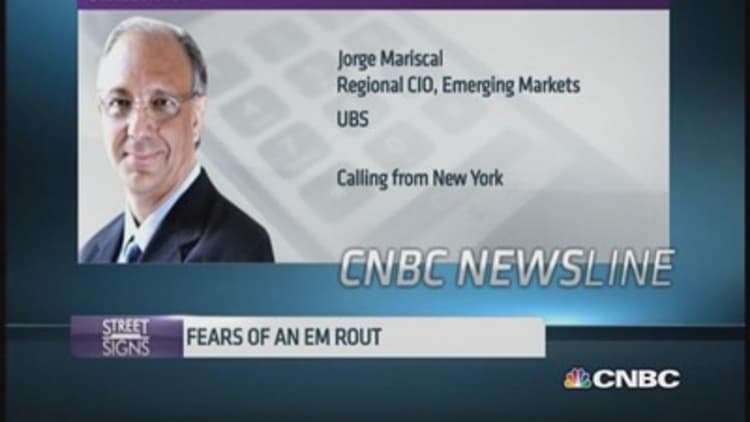
The ruble's plummet has spurred world-wide jitters, but it isn't clear whether 'rublegeddon' can or should cause a global market rout similar to the 1998 crisis.
"Russia itself is in a crisis, but it isn't a balance sheet crisis that should lead to some kind of default, which is what you did see in 1998," Jim Swanson, chief investment strategist at MFS Investment Management, told CNBC, citing the country's relatively low debt-to-gross domestic product (GDP) as well as "quite a bit" of foreign currency reserves.
Read More Coming soon: Capital controls in Russia?
The Central Bank of Russia (CBR) unexpectedly hiked rates by 650 basis points to 17 percent in the wee hours of Tuesday, Moscow time, to stem the beleaguered ruble's plunge. The currency rebounded, with the U.S. dollar buying to 60.00 rubles following the move, but it has since crumbled, with the U.S. dollar buying nearly 80 rubles Tuesday, a fresh record low for Russia's currency. The U.S. dollar was fetching 71.6 rubles during Asian trade on Wednesday.
It's the worst rout in the ruble since 1998, when its drop caused Russia to default on its debt and Long-Term Capital Management's wrong-way bets on the currency spurred not just the U.S. hedge fund's collapse but spread risks through financial markets.
Contagion?
Swanson doesn't expect rublegeddon will spread as the finger of blame can be pointed at the oil price drop, which historically has boosted global GDP growth.
Read More Indonesia's rupiah hits weakest since 1998
"The major banks of the world, we hope with all the new regulations, are not leveraged to this situation, either the commodity or the Russian ruble. I'm sure we'll find some ugly things in the debris here, but generally the course of earnings should actually improve for most countries," Swanson said.
The rub in markets, however, is that just because it doesn't make sense for fears to spread, doesn't mean they won't.
"There is some evidence of contagion even to countries that don't deserve it, that are being sold … simply because they are part of the emerging market complex," Jorge Mariscal, regional chief investment officer for emerging markets at UBS, told CNBC. "Some currencies, even in Asia have gotten hit even though most of the Asian economies are net oil importers. The fear that we are in front of a bigger crisis has gotten people a little bit afraid."
Read More Are Russia's bonds the next big worry?
Indonesia, for example, is generally viewed as a beneficiary of low oil prices due to a large fuel-subsidy bill, but its currency, the rupiah, shed more than 7 percent of its value against the U.S. dollar since the end of June, dropping to its weakest since the late 1990s' Asian Financial Crisis. The U.S. dollar was fetching as much as 12,930 rupiah earlier this week before retracing to 12,725 rupiah by Asian trade Wednesday.
The oil factor

Since mid-June, Brent crude oil has fallen from above $115 per barrel to around $59.42 a barrel in Asian trade Wednesday, with many analysts predicting prices will continue to slide.
Read More Nothing Russia can do for ruble if oil keeps falling: Pro
"It's not Russia only; there are other countries, Brazil maybe, where we could see currency weakness as well," Herald Van Der Linde, head of Asia-Pacific equity strategy at HSBC, told CNBC. "This spills over to this part of the world, maybe undeservedly so. Some countries -- India, Indonesia -- have done a good job in managing their economies," he said. "But irrespective of that, they'll come under pressure."
But Van Der Linde does see one major difference from the 1997-98 Asian Financial Crisis: corporate balance sheets are much healthier, without the heavy, unhedged U.S. dollar borrowing seen around 16 years ago. He expects markets in Asia to begin offering good buying opportunities.
—By CNBC.Com's Leslie Shaffer; Follow her on Twitter @LeslieShaffer1


